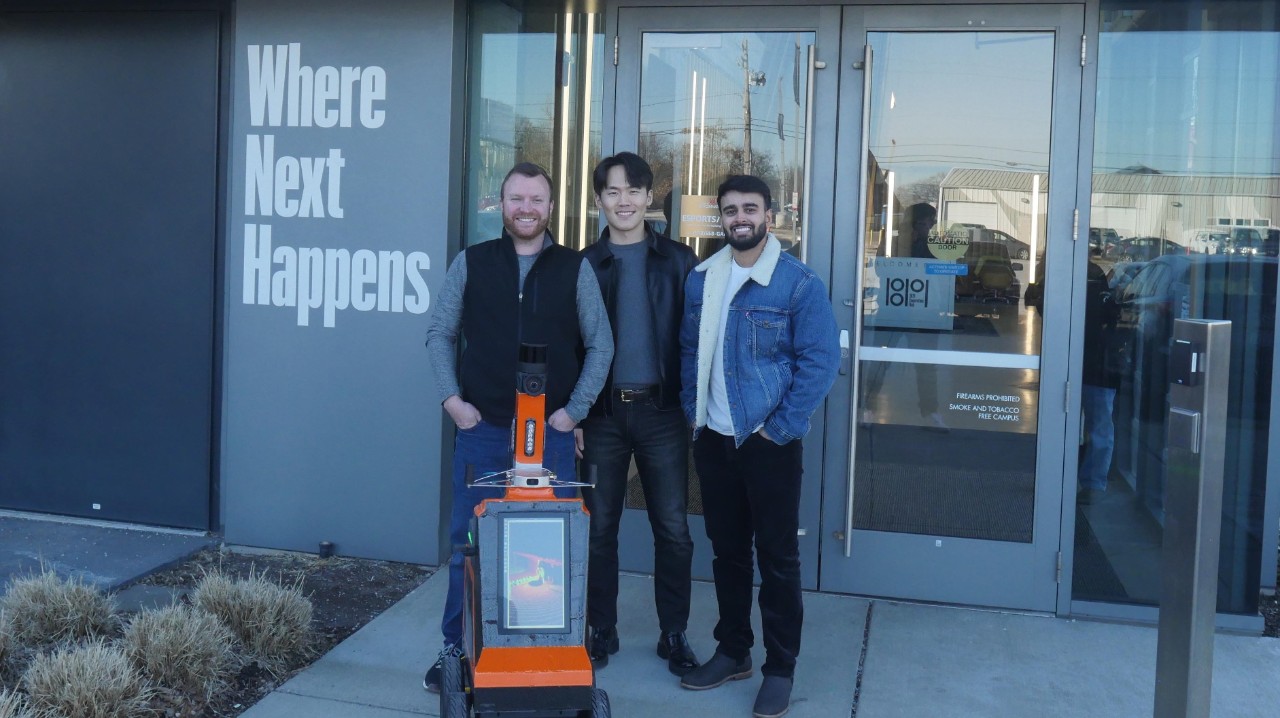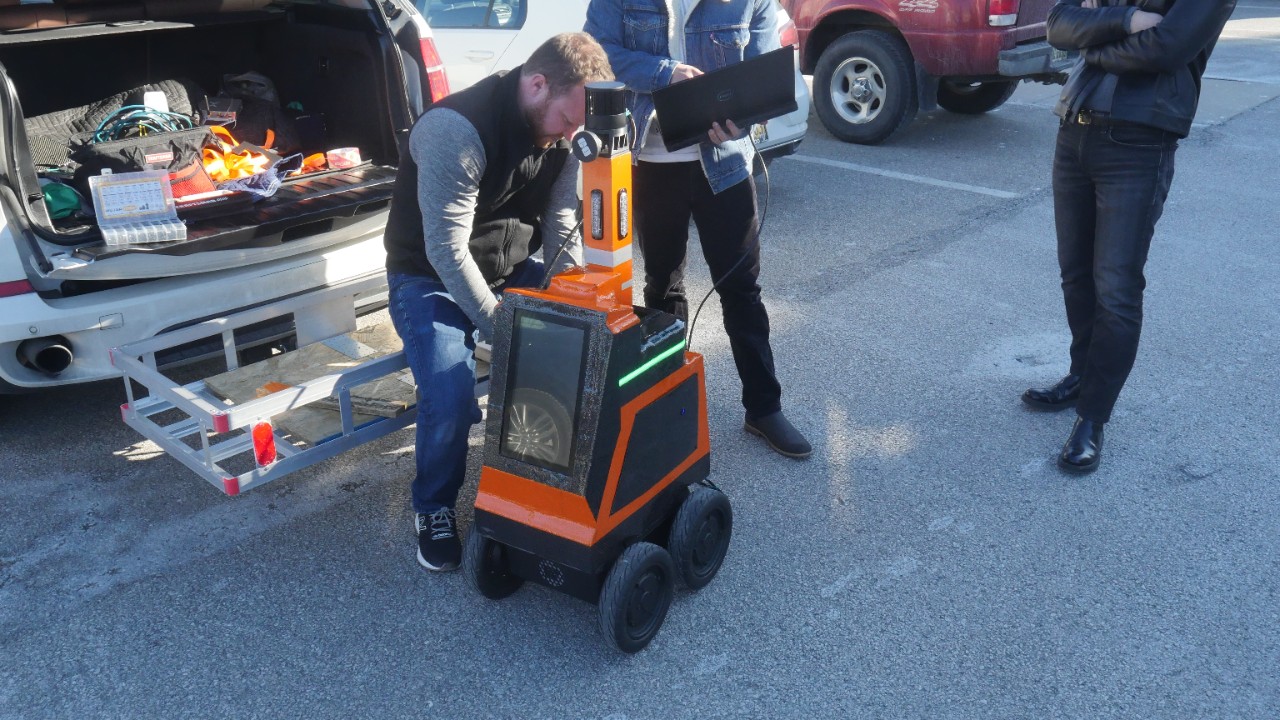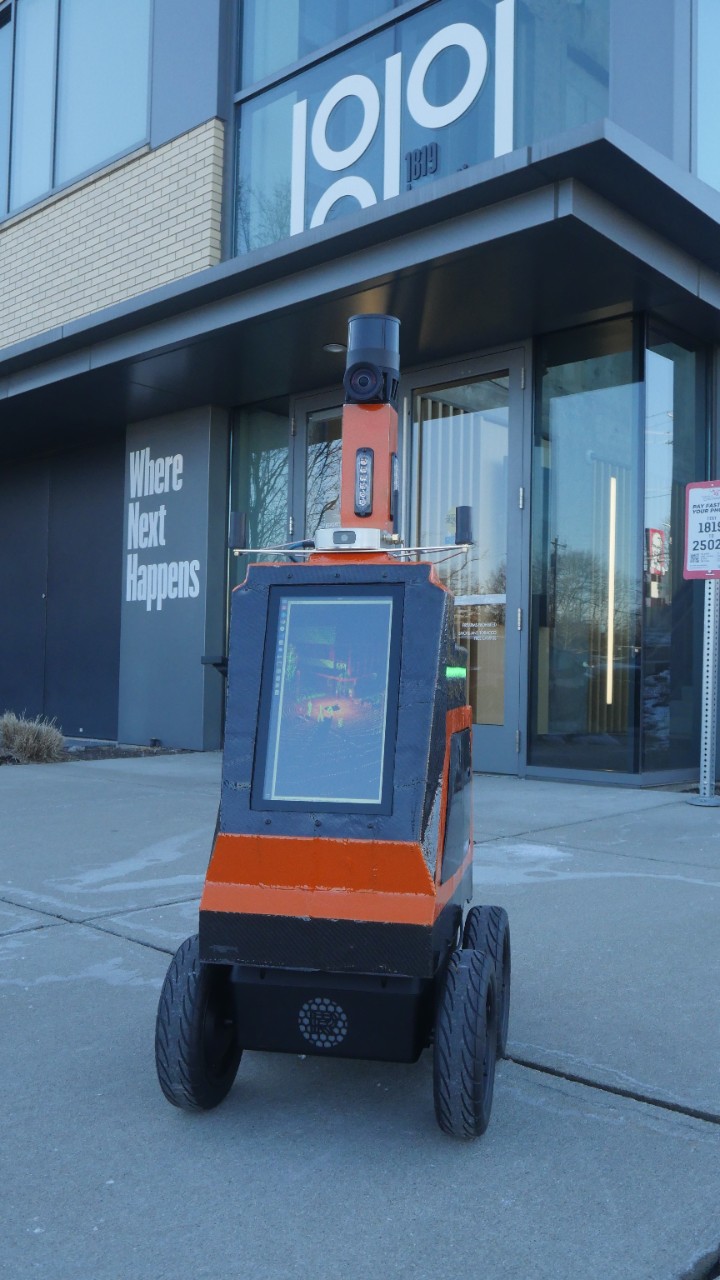
Groundbreaking UC startup propels aviation safety to new heights
Innovative robot poised to save billions in aircraft maintenance
Commercial aviation is a high-stakes, multi-billion-dollar industry where punctuality is paramount and cost efficiency is king.
Airlines face the daunting task of balancing on-time performance, operational costs and regulatory compliance, all while prioritizing the safety of passengers and meeting the stringent standards set by aviation authorities.
While aviation incidents such as crashes frequently make headlines, an article in the Wall Street Journal spotlighted the risks and safety hazards faced by the workforce beneath aircraft on the tarmac, which typically remains undisclosed to the public.
Local innovators Chris Kyoochul Lee, Jon Taylor and Huzefa Dossaji, offer a promising new startup solution to revolutionize aircraft ground handling process for enhanced safety.
They co-founded Airtrek Robotics, creating an autonomous robot that oversees ground crew tasks such as aircraft marshaling and foreign object debris (FOD) management. The technology operates within the aircraft safety envelope, ensuring no person or object is within the restricted perimeter during aircraft maneuvers.
“Airtrek Robotics aims to modernize outdated aircraft ground handling processes using autonomous technologies. This innovation utilizes advanced sensors and artificial intelligence to deliver an accurate, automated and cost-effective solution to enhance safety and efficiency of the operations,” Lee said.

Airtrek co-founder Jon Taylor works on the robot outside the 1819 Innovation Hub. Photo/Greg Glevicky
Prioritizing safety
Travelers often overlook the potential hazards of seemingly harmless objects on airport tarmacs, such as tools, luggage fragments, wildlife and debris. These items pose severe risks to aircraft, including tire damage, airframe punctures and engine issues. Moreover, when propelled by jet blast or rotor wash, FOD can cause injuries or fatalities among airport personnel.
The Federal Aviation Administration (FAA) estimates that damage from FOD costs the U.S. aviation industry $5.1 billion annually in lost revenue, with global costs reaching $13.9 billion annually.
Given the risky environment around aircraft, with engines running and constant motion, ground crews must always maintain acute situational awareness. Even the slightest oversight can lead to catastrophic consequences, resulting in severe injuries or loss of life. Aircraft marshalling, a crucial aspect of the ground handling process involving typically three personnel, is particularly susceptible to risks.
Last year, the FAA reported incidents in the marshalling area, including a fatal accident. This prompted a safety alert for operators, stressing the need for increased awareness and strict adherence to safety protocols during aircraft marshalling.
The technology of the Airtrek robot intends to play a pivotal role in marshalling procedures. Equipped with multiple sensors, these robots will serve as additional "eyes on the ground," augmenting and replacing the air marshalling process in some instances, further ensuring safety standards are met and exceeded.
With access to corporate partner support, the Venture Lab startup accelerator program and a state-of-the-art Groundfloor Makerspace, Airtrek illustrates how the 1819 Innovation Hub is the foundation for groundbreaking innovation.
Ryan Hays UC executive vice president and chief innovation and strategy officer
Standing out

The Airtrek robot in front of the UC 1819 Innovation Hub. Photo/Greg Glevicky
They’ve secured multiple grants, including one from Main Street Ventures, a Cincinnati-based nonprofit and partner of the 1819 Innovation Hub. This grant, known as the Entrepreneurial Launch Funding grant, was instrumental in supporting Airtrek's strategic co-founders. They utilized this capital along with coaching and resources provided by the Venture Lab pre-accelerator program, which specializes in accelerating startups from their inception to full commercialization.
As active startup partners within the 1819 ecosystem, Airtrek plans to capitalize further on its resources, enhancing the development of its robotic product by leveraging the facilities and support available at the UC Groundfloor Makerspace.
“Airtrek transformed their vision into reality," said Ryan Hays, UC executive vice president and chief innovation and strategy officer. "With access to corporate partner support, the Venture Lab startup accelerator program and a state-of-the-art Groundfloor Makerspace, Airtrek illustrates how the 1819 Innovation Hub is the foundation for groundbreaking innovation. This is the power of collaboration, driving startups to thrive and communities to prosper."
Cincinnati/Northern Kentucky International Airport (CVG) recognizes the potential in Airtrek's automated robotic capabilities as they begin their collaborative research and development stage toward product commercialization.
UC News previously toured CVG, where Chief Innovation Officer Brian Cobb commented how CVG is an ideal incubator for entrepreneurial innovators who wish to test an idea.
“Collaboration with a forward-thinking airport like CVG is a huge opportunity for us. Combining with CVG’s strategic guidance, we aim to transform the way the ground handling process happens, enhancing safety standards and productivity in the airfield,” Lee said.
Flying into the future but grounded in the past

AIrtrek robot at UC 1819 Innovation Hub. Photo/Greg Glevicky
The majority of aircraft ground handling remains manual and outdated. Without humans, airplanes are unable to dock at the gate. The prevalent method to mitigate FOD risks is still “FOD walks” where ground personnel manually inspect the ground and remove debris. Last year, an article on AviationPros cited a sluggish evolution of these procedures since the 20th century in the 1960s compared to the advancements in aircraft and airports.
“Autonomous technology is essential for modernizing the ground handling process. Autonomous robots can support human staff with laborious, monotonous and hazardous tasks. This collaboration allows human workers to redirect their efforts towards more complex, value-added activities in a safer environment, leading to heightened overall productivity,” Lee said.
The founders of Airtrek Robotics embody an innovative spirit and believe their technology can propel advancements in airport ground handling, revolutionizing the landscape of commercial aviation.
Featured image at top: Airtrek co-founders with their autonomous robot. Photo/Greg Glevicky
Impact Lives Here
The University of Cincinnati is leading public urban universities into a new era of innovation and impact. Our faculty, staff and students are saving lives, changing outcomes and bending the future in our city's direction. Next Lives Here.
Related Stories
UC receives grant for AI use in medical education
February 26, 2026
The University of Cincinnati is turning to artificial intelligence to help solve a problem in medical training. The College of Medicine was awarded a grant valued at more than $1 million to use AI in advanced physician training through personalized learning.
Why do female caribou have antlers?
February 24, 2026
Researchers at the University of Cincinnati discovered that female caribou feed extensively on shed antlers they find while grazing to supplement their diet with important minerals they need to raise calves. This could explain why female caribou, unique among deer, have antlers.
DTS hosts successful annual conference on AI and emerging tech
February 23, 2026
Hundreds of University of Cincinnati students, faculty, and staff members turned out for the third annual Digital Technology Solutions (DTS) AI & Emerging Technology Symposium, Wednesday, Feb. 18, 2026, in UC's Tangeman University Center.
